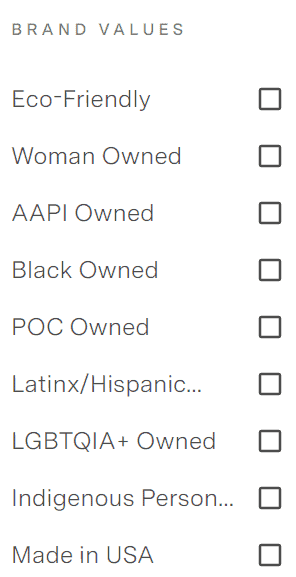
Are you looking for ways to make your small business more eco-friendly? If so, let’s freaking go! Making a few simple changes can help reduce your environmental impact.
Giving general business advice is always difficult because I don’t personally know you or what kind of business you have, but I’m going to do my best to give actionable sustainability advice for your business here.
Here are 17 ideas to get you started along with links, resources, and further reading to bookmark for when you have the time.
Affiliate Disclosure: This post contains affiliate links to some of the products listed in the article. If you choose to click on the links, I earn a commission if you decide to buy the item I recommended. Either way, I only recommend things I’d actually use and would be comfortable recommending to a friend.
Earth Disclosure: Chill Mamas acknowledges that the concept of an individual carbon footprint is a corporate scheme to shift blame. None of the content on this site is meant to imply that you are personally responsible for climate change. We need collective action in order to create a tangible shift in this narrative so that we can focus on pinning the responsibility to halt climate change where it belongs – on oil and gas companies along with large corporations who pollute the planet for profit. Here’s a video that summarizes these ideas if you’re interested in learning more.
Choose sustainable materials
One of the easiest ways to make your small business more eco-friendly is to choose sustainable materials to create your products. This means using renewable materials as well as materials that can be easily recycled or composted.
- Avoid utilizing plastic or anything that’s related to it.
- Make your products as lightweight as possible without compromising quality so that they don’t cost as much to ship.
- Use organic materials (like organic cotton) over non-organic materials.
- Utilize recycled fabrics, paper, and other materials where possible.
- Use natural textiles like cotton, linen, and hemp instead of rayon, polyester, and other poly blends.
If your company is not involved with the manufacturing process, be sure to source your products from brands that are focused on sustainability and can provide transparency related to what their products are made from and where those materials are farmed or sourced.
This is crucial to launching a business that’s actually sustainable. If your products are built sustainably, you can proudly share them without the fear of someone uncovering that they’re bad for the environment somehow.
Start a compost pile for paper packaging that cannot be re-used
Did you know that paper packaging accounts for a whopping 26% of all municipal solid waste in the United States? If your business produces a lot of paper packaging, consider starting a compost pile. This will help reduce the amount of waste going to landfill.
Unfortunately, a large percentage of recyclable materials are not actually recycled. There’s a lot of nuance here and much more development needs to happen in the area of recycling in order for it to be more viable as a solution to waste. That being said, anything that you can compost – please do it!
There are so many reasons to start composting and having a business will generate plenty of brown material, which is half of what you need for a thriving compost bin anyway. It doesn’t have to be a fancy setup.
Invest in energy-efficient appliances & tools for your business
From office equipment to manufacturing machinery, there are plenty of ways to make your business more energy-efficient. Look for appliances and tools with the Energy Star label.
These products have been certified by the US Environmental Protection Agency as being energy-efficient. It’s not perfect, but it’s much better than using inefficient appliances.
If there’s any way that you can bring solar or wind power into your business, that would also be iconic.
Use recycled or compostable materials for packaging and shipping purposes
As well as using sustainable materials for the actual products you sell, you can also make your packaging more eco-friendly by using recycled materials. This could mean using recycled paper or cardboard for boxes and packing material.
As far as shipping containers go, there are quite a few options that you can choose from but I want to talk about what the best shipping containers for sustainable businesses are. These are the options you’ll commonly see:
- Recycled paper mailers and boxes
- Recycled plastic mailers
- Compostable polymailers
- Regular old polymailers
Regular polymailers are made from plastic, so that’s not a good option. But what about the rest? What’s the “best” eco-friendly mailer? The short answer is the recycled paper mailers. Because they are made of recycled paper material, which is compostable and biodegradable.
Here’s the long answer, which I found well-explained on the EcoEnclose blog.
“We are not advocates of most plastic “biodegradable” packaging options as a solution for e-commerce shipments. They are almost always 100% virgin material, they lead consumers to dispose of them badly (i.e. people landfill them thinking the packaging will “go away” quickly), they are recycled and contaminate the recycling stream, or they are composted and aren’t actually certified as compostable.
Even worse, often, they are oxo-biodegradable. We advise companies looking into biodegradable plastic packaging to ask lots of questions to ensure they know what they are getting so they can accurately advise their customers how to dispose of something.”
EcoEnclose Blog
I tore through many, many eco-friendly packaging websites to check out the options, and one, EcoEnclose came out on top. You can use my link to get $20 off your first order with them if you want to. They ship internationally.
There are other options for eco-friendly packaging but I didn’t notice many of those sites taking a stance against virgin bioplastics as this one did.
Many “compostable polymailers” you’ll find on Amazon and other sites are made of new plastic materials and not actually certifiably compostable. I would personally rather support a company that does not carry those kinds of products.
List of companies with sustainable packaging:
- Grounded (Australia) – I’d go with their home compostable line if I were to shop here. They seem pretty transparent as a company, which I like – lots of info available on their site. They ship worldwide and offer custom packaging options.
- Elevate Packaging (USA, Chicago) – Another good option. They differentiate between compostable and biodegradable packaging and seem to point out greenwashing in the sustainable packaging space. they offer custom packaging.
- EcoEnclose (USA, Colorado) – I talked about EcoEnclose a bunch above this list. Good stuff, good pricing. They do custom packaging as well.
Shop POC-owned brands, AAPI-owned brands, and Indigiounous-owned brands
When it comes to sourcing eco-friendly products for your business, it’s important to support brands that are owned by people of color, indigenous people, and other marginalized communities. These brands are often more sustainable and have a lower environmental impact than mainstream brands.
That’s partially because many non-white people have been thinking about and working toward a greener future for much longer than white people have.
Here’s how to do it:
- Slow down with your product sourcing. Pay attention to who you’re buying from and intentionally support Black-owned brands, Latinx-owned brands, Asian and pacific islander owned brands, and indigenous-owned brands.
- Check out hashtags on Instagram like #shopblackowned #aapiowned #indigenousowned #blackownedbrand to find businesses and brands to connect with and buy from.
- If you’re really short on time, try shopping on sites where you can filter this kind of information in a product search. For example, Abound, a popular wholesale website, has the option to filter and select brands based on who owns them and what values the brand aligns with.

Locally source your small business’s materials and products when possible
One of the best ways to reduce your business’s carbon footprint is to source materials and products locally. This cuts down on transportation emissions and supports local businesses.
Less shipping, fewer problems!
It’s understandable if you cannot close the gap as much as you want to when it comes to buying supplies for your business but think about finding local suppliers for some of the items you utilize.
- Can you find a local printer for business cards, flyers, and other paper goods?
- Can art supplies be sourced at a local shop?
- Can some of your office snacks come from a market nearby?
Be aware of your supply chain logistics and human rights issues within it – always improve when you can

When it comes to eco-friendly small businesses, it’s not just about the products you sell and the materials they’re made out of. It’s also important to be aware of your supply chain and the human rights issues that might be present within it. Make sure you’re only working with suppliers who meet your ethical standards.
Many suppliers won’t have this level of transparency. Right now, it’s difficult to find out the answers you might need to make a decision on whether a supplier has ethical standards or not. I completely understand that this takes up valuable time, but it’s well worth it. Humans are, after all, valuable, and they should not be getting exploited.
Here’s how:
- Send emails to your suppliers and ask them the difficult questions.
- Demand transparency if they dodge questions and/or don’t provide receipts.
- If they don’t provide transparency, move on to the next supplier.
When we start to demand transparency and fair wages from companies, it will start to become the norm. Lots of people are working on this right now, but we need to normalize taking time to establish an ethical supply chain, even for small businesses.
Promote a green message to your customers by boosting posts from environmental activists on social media
As a small business, you have a unique platform to promote eco-friendly messages to your customers. You can do this by sharing posts from environmental activists and organizations on social media. This will help raise awareness of the issues and encourage people to make more sustainable choices.
Consistently educate yourself and your team about eco-friendly practices
The most important thing you can do to make your small business more eco-friendly is to educate yourself and your team about sustainable practices. This way, you can make sure everyone is on board with your green initiatives and is taking steps to reduce the business’s impact on the environment.
Donate a portion of your revenue to environmental causes
One way to show your customers that you’re serious about being eco-friendly is to donate a portion of your revenue to environmental causes. This could be anything from planting trees to supporting renewable energy initiatives.
You can do this manually by donating a certain percentage of your revenue to a nonprofit, cause, or project of your choice. Alternatively, your business can join 1% for the Planet or something similar to help simplify this process.
Participate in activism work to help the planet, not just your business
It’s important to remember that being eco-friendly is about more than just your small business. It’s also about taking action to protect the planet. This could mean participating in local environmental activism or supporting national and international organizations that are working to make a difference.
Plant trees & flowers in your neighborhood or fund a community garden

Trees & flowers help clean the air, provide shade, and make our neighborhoods more beautiful. You can plant trees & flowers in your own yard or fund a community garden with some of your business’s revenue. Additionally, you can start a fundraiser or explore ways to get funding from your local government for a project like this.
Offset your shipping emissions
If you sell products online, you can offset your shipping emissions by planting trees. For every pound of carbon dioxide that your shipments produce, you can fund the planting of one tree.
If your small business is on Etsy right now, they already offset emissions. Woohoo.
But suppose you have your own website, which is what most business owners will go with eventually because it makes sense financially speaking. In that case, you’ll need to look into other options to offset your business’s shipping emissions.
Here’s how to do it:
- Cloverly is a platform focused on helping make it easy for brands to start offsetting their carbon emissions through carbon removals and offsets. Check out information about their Shopify and BigCommerce apps here, but they have an option to talk with them about custom integrations if you’re not on one of those two platforms. Ecommerce isn’t the only thing they help with, though, so if you’re in another industry just start at the homepage and find what applies to your business. Here’s how it works.
Use Ecosia for online searches (Businesses conduct a lot of them!)
Ecosia is a search engine that plants trees with its advertising revenue. When you use Ecosia, you help the environment for free.
There are times that you might want to use Google instead, but for general product research and most of your daily searches, you can use Ecosia to green-ify your web searches and add to the growing number of trees they’re able to plant with the ad revenue.
Use green hosting for your website
Even web hosting contributes to climate change! By using a web hosting company that acknowledges this fact and takes action to correct it, your business will be greener. There are two web hosting companies that I recommend if you’re interested in more sustainable web hosting without compromising the quality of your hosting.
- GreenGeeks – They’re totally focused on being sustainable and have a lot of information available about this.
- DreamHost – They aren’t as focused on it, but they acknowledge it and are currently taking action to address their carbon footprint.
Both companies are good choices and greener choices than the top dogs when it comes to web hosting. And both have high-quality service – as a web designer, I recommended DreamHost to all my clients after testing the top 10 most recommended website hosting companies.
Now I use both companies for different websites I have so that I can experience their services and confidently recommend them to others.
Start taking recycling seriously
Recycling might seem like a no-brainer, but sadly, many small businesses still aren’t doing it. Make an effort to reduce the amount of waste your business produces. This could mean recycling everything from paper and plastic to electronics and furniture.
Recycling programs that are effective are notoriously difficult to come by (at least in the U.S) and it’s something that you’ll probably need to pay for. I’m hoping that recycling will become more financially accessible in the near future. I want to point you to a few resources for recycling items that might not be curbside-recyclable in your area.
Have a community mindset and share other up-and-coming eco-friendly businesses to help them succeed

Supporting other eco-friendly businesses helps create a community of like-minded entrepreneurs and makes it more likely that sustainable practices will become the norm.
Sharing other businesses’ posts, products, calls to action, and ideas won’t hurt your own business. And you can do it in a non-salesy way, too.
These are just a few ideas to get you started. The most important thing is to be creative and committed to making your small business as eco-friendly as possible. Every little bit counts!

